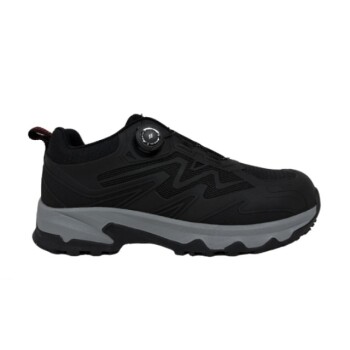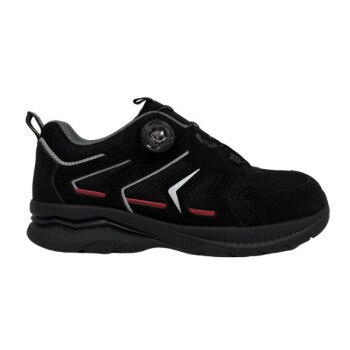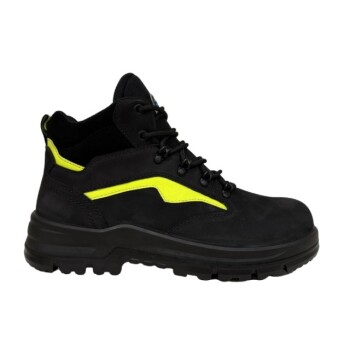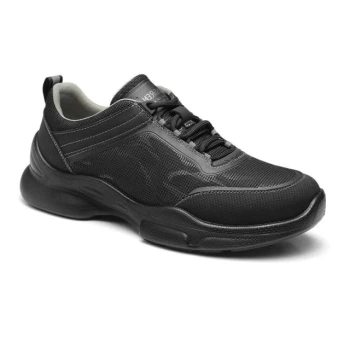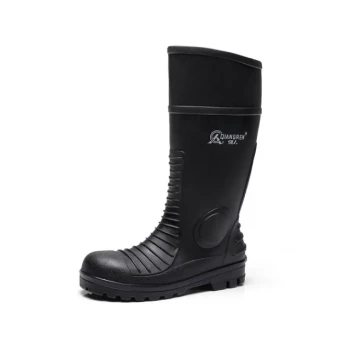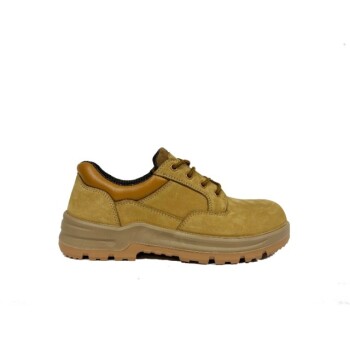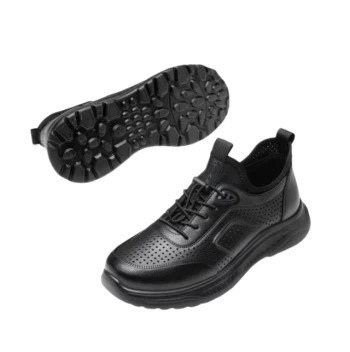For a truly permanent, non-slip solution, the most effective method is to have a professional cobbler replace the original soles of your shoes with new, certified non-slip ones. This is the only approach that fundamentally alters the shoe's construction for lasting safety, addressing the root cause of poor grip rather than just masking the symptom.
While many quick fixes exist, they are unreliable for long-term safety. The only definitive solution is professional sole replacement, which installs materials and tread patterns specifically engineered for maximum grip on slick surfaces.
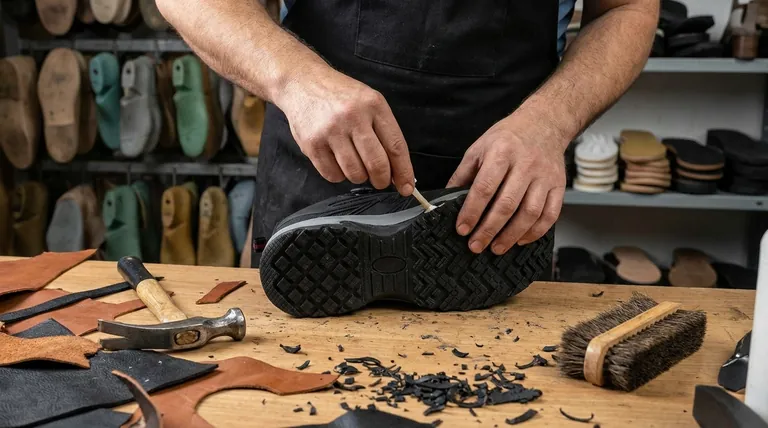
Why Professional Sole Replacement is the Gold Standard
Temporary sprays and stick-on pads offer a short-term fix, but they fail to address the core design flaw of a slippery shoe. A professional replacement is a fundamental upgrade to the shoe itself.
The Science of a Non-Slip Sole
A true non-slip sole is engineered with two key features. First is the material, which is typically a soft yet sturdy rubber compound that maximizes surface contact and friction.
Second is the tread pattern. Intricate patterns, often using shapes like hexagons, create channels that actively eject water, oil, and other liquids from beneath the sole. This prevents hydroplaning and ensures the rubber always makes direct contact with the ground.
Addressing the Problem at the Source
When a cobbler replaces your soles, they are removing the original, ineffective material and tread. They then bond a new, purpose-built sole to the shoe, permanently correcting the design flaw.
Unmatched Durability
Unlike coatings that wear off or adhesive pads that peel away, a professionally attached sole is an integral part of the shoe. It is designed to withstand the same daily wear and tear as the rest of the footwear, ensuring the non-slip properties last for the life of the sole.
Understanding the Trade-offs
This solution provides the highest level of safety and durability, but it's important to understand the associated factors before proceeding.
The Investment in Safety
Professional resoling is the most expensive option compared to temporary DIY products. You should view it as an investment in your safety and in extending the functional life of a pair of shoes you value.
Dependence on Professional Skill
The quality of the outcome is entirely dependent on the skill of the cobbler. It is crucial to find a reputable and experienced professional who understands how to properly balance and bond new soles without compromising the shoe's structure.
Minor Changes to Shoe Feel
Adding a new, high-traction rubber sole may slightly alter the weight and flexibility of the shoe. This is typically a minor adjustment and a worthwhile trade-off for the significant increase in grip and safety.
Making the Right Choice for Your Goal
Deciding on the best course of action depends entirely on your specific needs and the value of the footwear.
- If your primary focus is maximum safety in a work environment: Professional sole replacement is the only reliable and compliant choice.
- If you are preserving a high-quality pair of shoes you love: Investing in new, superior soles is the best way to enhance their function and extend their usable life.
- If you need an immediate, temporary fix for a low-risk situation: Stick-on grip pads can provide a short-term solution, but they should not be trusted for long-term safety.
By changing the sole itself, you gain a permanent foundation of safety and confidence in every step you take.
Summary Table:
| Solution | Effectiveness | Durability | Best For |
|---|---|---|---|
| Professional Sole Replacement | Permanent & High | Long-lasting (life of sole) | Maximum safety, work compliance, valuable shoes |
| Temporary Sprays/Pads | Low & Temporary | Short-term | Immediate, low-risk situations only |
Need a permanent, reliable non-slip solution for your footwear line?
As a large-scale manufacturer, 3515 produces a comprehensive range of certified non-slip footwear for distributors, brand owners, and bulk clients. Our production capabilities encompass all types of safety shoes and boots, engineered with advanced rubber compounds and tread patterns for maximum grip and durability.
Let us help you provide your customers with the highest standard of safety. Contact our experts today to discuss your manufacturing needs and enhance your product line with truly effective non-slip footwear.
Visual Guide
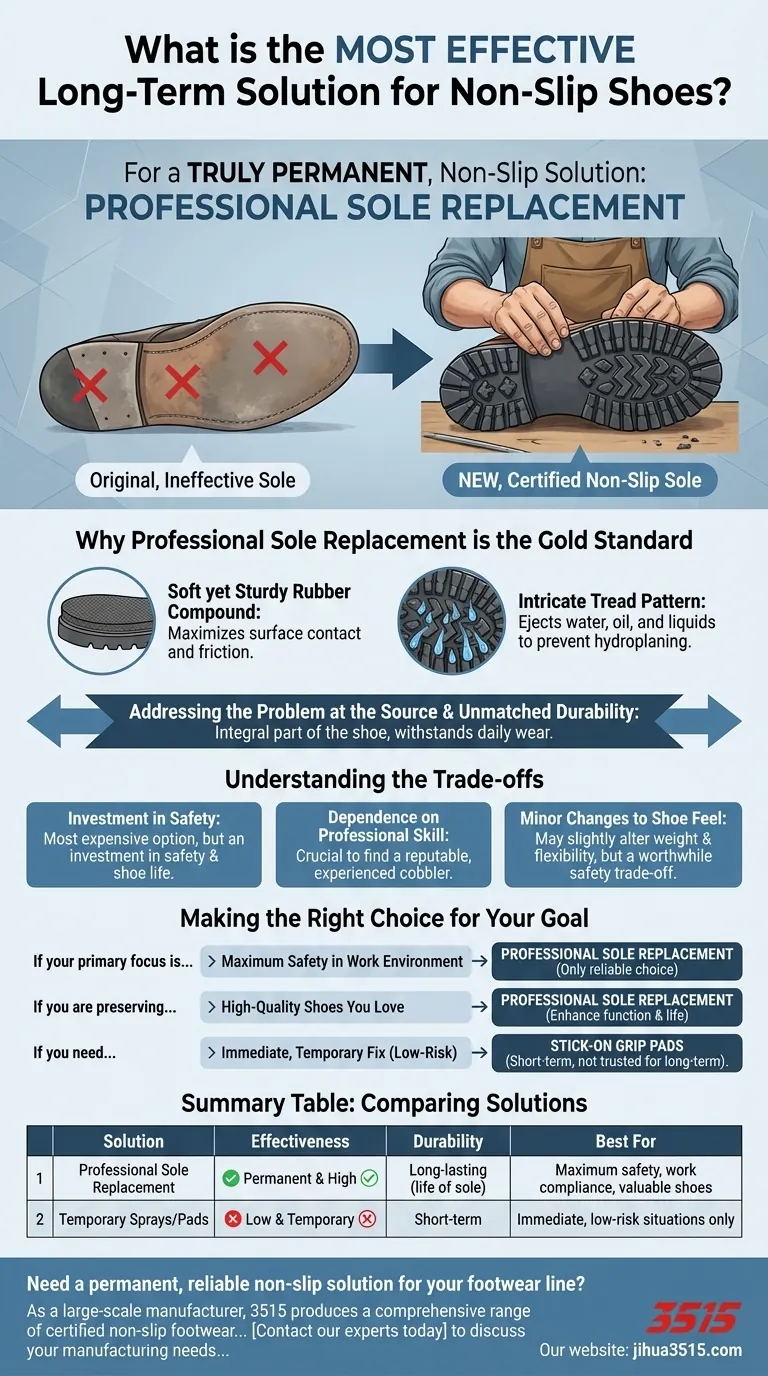
Related Products
- Advanced KPU Athletic Safety Shoe with Steel Toe Cap Anti-Slip Rotary Lacing System
- Premium Safety Shoes with Rotating Buckle Safety Sneakers
- Wholesale Premium Waterproof Nubuck Safety Shoes Boots
- Wholesale Durable Safety Boots | Custom Steel Toe & Puncture-Resistant Manufacturing
- Factory-Direct Wholesale Canvas Boots with High-Traction Rubber Soles
People Also Ask
- Is safety-toe as good as steel toe? Choose the Right Protection for Your Job
- What is a working boot? Your Essential Guide to Foot Safety and Durability
- What distinguishes heavy duty work boots from regular boots? Safety, Durability & Purpose Explained
- How do safety shoes protect you? A Guide to Essential Footwear Safety Features
- Are safety shoes worth it? The Critical Investment in Workplace Safety & Foot Health
